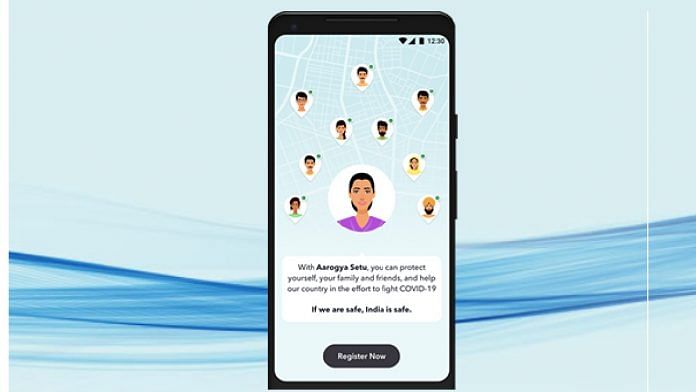New Delhi: As part of a new database called ‘Covid Tracing Tracker’, the MIT Technology Review has given India’s Aarogya Setu app two out of five points. The review is based on an index developed to track and assess various contact tracing apps that are backed by governments across the world.
The database asks five basic questions — is it voluntary, will data be destroyed after a period of time, are there limitations on how the data gets used, is data collection minimised and is the effort transparent. If after review, the answer is yes, an app gets a star. If the answer is negative, or cannot be answered due to lack of information, the rating is left blank.
The review gave Aarogya Setu points only for useful data and deleting this data on time. The Indian app lost out on parameters related to voluntary use, limitations on data usage, and transparency. The tracker also noted that India was the “only democracy making its app mandatory for millions of people”.
Launched in early April, Aarogya Setu has so far been downloaded in nearly 10 crore smartphones.
While India’s official policy claims that downloading the app is voluntary, there have been several strong directives by the government to download it. If the home ministry had directed private employers to ensure that a 100 per cent of their staff should download the app, the Uttar Pradesh government has said that people could face a fine or jail term if found without the app on their phones.
The app has also come under fire from Opposition leaders and internet freedom activists. Congress leader Rahul Gandhi had flagged concerns about data security while downloading it. French ethical hacker Elliot Alderson also took on the government and claimed that the app could easily be hacked into. He even demonstrated several loopholes in the app’s security system.
Also read: Confusion over Aarogya Setu as Railways says app must for Rajdhani but gives no guidelines
Many apps found to be ‘pervasive and invasive’
The publication, that was founded at the Massachusetts Institute of Technology (MIT) in 1899, has said that technologists across the world have been quick to build apps, services and systems for contact tracing in order to identify all those who come in contact with a carrier of the novel coronavirus.
But many of these apps were found to be “lightweight and temporary”, while some “pervasive and invasive”, it noted. The review also gave an example of the contact tracing app in China that “sucks up data including citizens’ identity, location, and even online payment history so that local police can watch for those who break quarantine rules”.
Out of the 25 apps the database has documented and reviewed so far, some of the others include include Australia’s COVIDSafe, the Chinese health code system, France’s StopCovid and the Germany Corona App.
The review also said how these apps affect societies need to be questioned. “How many people will download and use them, and how widely used do they have to be in order to succeed? What data will they collect, and who is it shared with? How will that information be used in the future? Are there policies in place to prevent abuse?” it asked.
During the process of comparing different apps, it was found that there was no standard approach being employed by developers and policymakers. Citizens in different countries were witnessing very different levels of surveillance and transparency.
The database is hence meant to be an effort to document and evaluate the different contact tracing efforts being undertaken by everyone, from small groups of coders, to big corporations like Apple and Google.
Also read: Amazon or Aarogya Setu, RSS affiliate is just not happy with NITI Aayog CEO Amitabh Kant




Worst app. Put multiple users phones closely to check app and it’s efficiency. You will know different results on different phones like number in 500 meters 1 km so on and self assessment of safe all different results. And yes our government is dependent and rely on its data.
Mera Bharat mahan air mahan iske neta
Regarding contact tracing
App is only used to check how many positive “Mister India” are at High Risk surrounded to you.
You did not know there contact or other details so one can check their status.
Rightly said. Why blame MIT when they are quoting facts. During my usage, not once did it notify me of any corona carriers nearby or did anything, remotely useful that I could feel happy to retain it.
And for people who are blaming US, stop doing that and look at your own backyard. We Indians had been lasting our own back way too long and ended up being the top three most infected countries. And don’t even get me started on the fudged death toll. With the worst medical care in the world, how can a sane human ever believe that the death toll in India, with that many infected cases, can be they low. Everything is just make believe. So stop being proud of what’s not in front of your eyes.
Who CARES about some MIT “”points”” ??
The App is to save lives – not win Popularity contests by a country that has totally failed to control the pandemic.
Everyone concerned about privacy and cyber security.
Misleading headline critical of India as always from The Print.